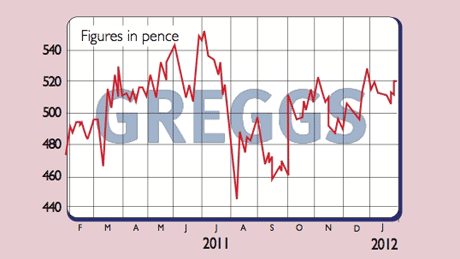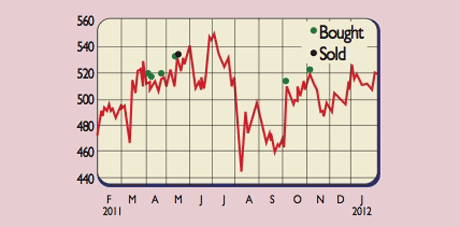Shares in focus: Greggs bucking the downturn
There's a lot to like about Britain's high street baker Greggs, says Phil Oakley. Besides its baked treats, its shares look appealing too.
Get the latest financial news, insights and expert analysis from our award-winning MoneyWeek team, to help you understand what really matters when it comes to your finances.
You are now subscribed
Your newsletter sign-up was successful
Want to add more newsletters?

Twice daily
MoneyWeek
Get the latest financial news, insights and expert analysis from our award-winning MoneyWeek team, to help you understand what really matters when it comes to your finances.

Four times a week
Look After My Bills
Sign up to our free money-saving newsletter, filled with the latest news and expert advice to help you find the best tips and deals for managing your bills. Start saving today!
The business
Greggs is a national chain of 1,550 bakery shops, selling sandwiches, savouries (sausage rolls and pasties), cakes and drinks to six million customers every week. Ten regional bakeries and a fleet of 375 delivery vehicles support the shops.
This allows Greggs to make around 90% of what it sells, giving it better control of costs and product quality. Its aim is to sell tasty, freshly baked food at great value prices.
The history
Greggs has come a long way since its founder, John Gregg, used his bicycle to deliver yeast, eggs and confectionery in the late 1930s. In 1951, he opened a small shop in Gosforth outside Newcastle with a bakery on the back. The business didn't grow much until John's death in 1964, when his son Ian took over. During the 1960s and 1970s, Ian expanded Greggs away from its north-east roots by buying established regional bakers.
MoneyWeek
Subscribe to MoneyWeek today and get your first six magazine issues absolutely FREE

Sign up to Money Morning
Don't miss the latest investment and personal finances news, market analysis, plus money-saving tips with our free twice-daily newsletter
Don't miss the latest investment and personal finances news, market analysis, plus money-saving tips with our free twice-daily newsletter
By the time he handed over to Michael Darrington in 1984, Greggs had four bakeries, 260 shops and sales of £37m. It floated on the stock exchange in the same year. Darrington used the proceeds to expand into new geographic areas. Then, in 1994, Greggs bought rival chain Bakers Oven, which doubled its size and gave it exposure to south-east England.
While Greggs has had to cope with a weak British economy and rising costs in recent years, its shares have been a good buy. A share bought at flotation in 1984 at £1.35 would now be worth more than £52 (£5.20 after share split). Dividends of 18.25p per share in 2010 (£1.82 unadjusted) would give an income return on cost of 135%.
The chief executive
Ken McMeikan became CEO in 2008 after a successful career in food retailing, having been head of Tesco's Japanese business and also retail director at Sainsbury's. At Greggs, he keeps in touch with customers by visiting several shops a week. He has even been known to spend some days working behind the counter. He was paid £700,000 in 2010.
Why you should buy the shares
There's a lot to like about Greggs. Its shares are a classic defensive play and offer some growth on top. The fact that it offers customers excellent value for money remains its key attraction.
However, it is also very good at moving with the times. With British high streets depressed, Greggs is moving more of its stores closer to where people work and travel airports, train stations and industrial parks which looks sensible. It is also tapping into new revenue streams, such as breakfasts and coffee. Greggs sells good coffee for 25%-30% less than more established rivals. Unsurprisingly, it is seeing positive growth here.
The company wants to have 2,000 stores in Britain, which would give it a platform for further growth. And with the current weak state of the commercial property market, it may be able to acquire new sites at reasonable prices.
Last but not least, Greggs has impeccable finances. It has no debt and finances all its business investment and dividend payments from its own cash flow something Tesco and Sainsbury's, for example, have struggled to do. With energy and ingredient cost pressures easing, the shares on 12.4 times forward earnings, and paying a 4% dividend yield look well worth having.
The numbers

Key facts
Stockmarket code: GRG
Share price: 520p
Market cap: £527m
Net assets (July 2011): £183.9m
Net cash (July 2011): £8.8m
P/e (current year estimate): 12.4
Yield (prospective): 4.0%
What the analysts say
Buy: 5
Hold: 5
Sell: 1
Average price target: 486p
Director Shareholding

K McMeikan: 72,475
R Hutton: 55,003
R Reynolds: 52,440
D Netherton: 11,946
Get the latest financial news, insights and expert analysis from our award-winning MoneyWeek team, to help you understand what really matters when it comes to your finances.
Phil spent 13 years as an investment analyst for both stockbroking and fund management companies.
-
 Should you buy an active ETF?
Should you buy an active ETF?ETFs are often mischaracterised as passive products, but they can be a convenient way to add active management to your portfolio
-
 Power up your pension before 5 April – easy ways to save before the tax year end
Power up your pension before 5 April – easy ways to save before the tax year endWith the end of the tax year looming, pension savers currently have a window to review and maximise what’s going into their retirement funds – we look at how